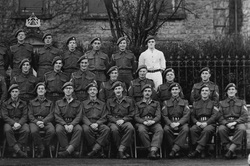Basic Training

As any soldier, sailor or Marine who has gone through basic training will tell you, the experience is one that he/she remembers long after other memories fade. Mr. Lock traveled to Ft. McClellan, Alabama to complete his 13 weeks of Army basic training which included infantry training. Many of the soldiers Mr. Lock served with during the Battle of the Bulge were not as lucky, however. Because there were so many casualties occurring in Europe (about 400 per week) at this time, many of these soldiers only had three to five weeks of basic training. They couldn't use a weapon properly, had no infantry training and were moved directly into theater from basic training. Mr. Lock's basic training consisted of recruits who had been drafted, enlisted on their own, or had gone to school at VMI or the Citadel. He was given a service number to identify him. Because he had enlisted, his service number started with the number one. He would eventually have three separate service numbers throughout his military career (one for enlisted Army, one for Navy enlisted, and one for Army officer).
At this time, Ft. McClellan was also a POW camp for German soldiers. Mr. Lock would see the Germans playing volleyball during his training and remembered they looked quite strong and healthy. He said the POW’s had better food than the recruits did. The German POW’s got fresh milk to drink while the recruits got powdered milk. During his training he was issued a rifle with bayonet. He had extensive training on the correct use of the bayonet and thought that he “would rather just shoot them (the Germans) than use the bayonet” because they looked so big and strong.
The recruits also learned to dig their own trenches. They had to crawl through a field with a machine gun firing at them. The machine gun was at level height and was meant to teach them to keep their heads down when crawling through a field. The recruits had to endure tear gas training also. They entered a small room with their gas masks on and the door was closed. They then removed their masks and waited a few minutes before being able to leave the room. Only after they had left the room could they put their masks back on.
At this time, Ft. McClellan was also a POW camp for German soldiers. Mr. Lock would see the Germans playing volleyball during his training and remembered they looked quite strong and healthy. He said the POW’s had better food than the recruits did. The German POW’s got fresh milk to drink while the recruits got powdered milk. During his training he was issued a rifle with bayonet. He had extensive training on the correct use of the bayonet and thought that he “would rather just shoot them (the Germans) than use the bayonet” because they looked so big and strong.
The recruits also learned to dig their own trenches. They had to crawl through a field with a machine gun firing at them. The machine gun was at level height and was meant to teach them to keep their heads down when crawling through a field. The recruits had to endure tear gas training also. They entered a small room with their gas masks on and the door was closed. They then removed their masks and waited a few minutes before being able to leave the room. Only after they had left the room could they put their masks back on.
